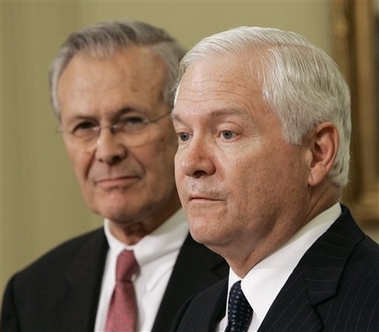Bush taps Gates to replace Rumsfeld
(AP)Updated: 2006-11-09 10:19
WASHINGTON - After years of defending his secretary of defense, President Bush on Wednesday announced Donald H. Rumsfeld's resignation within hours of the Democrats' triumph in congressional elections. Bush reached back to his father's administration to tap a former CIA director to run the Pentagon.
The Iraq war was the central issue of Rumsfeld's nearly six-year tenure, and unhappiness with the war was a major element of voter dissatisfaction Tuesday - and the main impetus for his departure. Even some GOP lawmakers became critical of the war's management, and growing numbers of politicians were urging Bush to replace Rumsfeld.
Bush said Robert Gates, 63, who has served in a variety of national security jobs under six previous presidents, would be nominated to replace Rumsfeld. Gates, currently the president of Texas A&M University, is a Bush family friend and a member of an independent group studying the way ahead in Iraq.
The White House hopes that replacing Rumsfeld with Gates can help refresh US policy on the deeply unpopular war and perhaps establish a stronger rapport with the new Congress. Rumsfeld had a rocky relationship with many lawmakers.
"Secretary Rumsfeld and I agreed that sometimes it's necessary to have a fresh perspective," Bush said in the abrupt announcement during a postelection news conference.
In a later appearance at the White House with Rumsfeld and Gates at his side, Bush praised both men, thanked Rumsfeld for his service and predicted that Gates would bring fresh ideas.
"The secretary of defense must be a man of vision who can see threats still over the horizon and prepare our nation to meet them. Bob Gates is the right man to meet both of these critical challenges," Bush said.
But underscoring that he would not bow to those pushing for a quick US withdrawal, Bush also said, "I'd like our troops to come home, too, but I want them to come home with victory."
In brief remarks, Rumsfeld described the Iraq conflict as a "little understood, unfamiliar war" that is "complex for people to comprehend." Upon his return to the Pentagon after appearing with Bush and Gates, Rumsfeld said it was a good time for him to leave.
"It will be a different Congress, a different environment, moving toward a presidential election and a lot of partisanship, and it struck me that this would be a good thing for everybody," Rumsfeld told reporters.
There was little outward reaction among officials at the Pentagon, beyond surprise at the abrupt announcement.
Asked whether Rumsfeld's departure signaled a new direction in a war that has claimed the lives of more than 2,800 US troops and cost more than $300 billion, Bush said, "Well, there's certainly going to be new leadership at the Pentagon."
Voters appeared to be telling politicians that the sooner the war ends the better. Surveys at polling places showed that about six in 10 voters disapproved of the war and only a third believed it had improved long-term security in the United States.
Pentagon spokesman Bryan Whitman said Rumsfeld was not leaving immediately. Rumsfeld planned to deliver a speech on the global war on terrorism at Kansas State University on Thursday.
Just last week Bush told reporters that he expected
Rumsfeld, 74, to remain until the end of the administration's term. And although
Bush said Wednesday that his decision to replace Rumsfeld was not based on
politics, the announcement of a Pentagon shake-up came on the heels of Tuesday's
voting.
| 1 | 2 |  |
|
||
|
||
|
|

